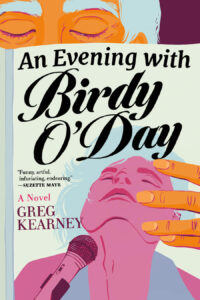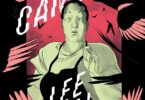 Reviewed by Andrew Woodrow-Butcher
Reviewed by Andrew Woodrow-Butcher
Greg Kearney, An Evening with Birdy O’Day (Arsenal Pulp Press, 2024), 336 pp., $24.95.
At 69 years old, Roland is long past the peak of his hairdressing career. And after 25 years together, he and his handsome, chronically ill boyfriend Tony have settled into a comforting rhythm. Between setting perms, correcting highlights, and occasionally venturing to the bar for a few too many drinks, Roland still keeps a scrapbook about his childhood friend, faded pop star Birdy O’Day. And when Birdy announces, decades after the peak of his stardom, a concert in their native Winnipeg, Roland and Tony aren’t sure what to make of it.
In his second novel, writer and playwright Greg Kearney offers a layered, subtle story of queer youth, of fame and obscurity, and of queer aging. Set largely against the backdrop of Winnipeg in the 60s and 70s, but continuing to our present-day, An Evening with Birdy O’Day delights with its surprising, thoroughly realized cast of characters, and its impressive conjuring of gravitas in a story that might, in a less skillful author’s hands, have descended to melodrama.
Birdy O’Day and Roland grew up together, before Birdy made it big. Elementary school friends, the two formed a lifelong connection when Birdy’s alcoholic mother passed, and his abusive father declined to take care of his effeminate progeny. Instead, Roland’s eccentric mom Margaret took the boy in, and Birdy and Roland grew up together as best friends, almost-brothers, and sometime-boyfriends. Even from that early age, Birdy and all those around him knew he was destined to become a star.
We watch as young Roland and Birdy plot a future together: Birdy will become a glamorous pop star, and Roland will stay by his side, ironing his shirts, say, and just generally taking care of little things. But when a record deal actually comes to the prodigious teen, Birdy leaves for Toronto and cuts Roland out of his life completely. Left behind, Roland spends years nursing bitter feelings of betrayal while keeping track of his friend’s successes and eventual failures in the headlines. More than 40 years later, when Birdy’s people reach out to Roland to not only invite him to Birdy’s Winnipeg show, but to get together backstage afterwards, Roland’s memories of their shared past crowd his thoughts.
A ballerina birthday cake that led to tears. That time a very handsome therapist tried to ward the boys away from homosexuality, only to be revealed later that evening as a huge queen himself. The awful-yet-award-winning poetry recited by Roland’s mom’s new girlfriend. The defining moments of their tandem childhoods fascinate all the more with the knowledge that the two will eventually break apart.
Kearney unspools a mesmerizing yarn, and his book plays productively against reader expectations from start to finish. Where his portrait of a less enlightened, more impoverished world of Winnipeg in the 60s and 70s might have been handled with irony or at least a tone of contemporary smirk, Kearney shows the social and class problems of the past as contiguous with ours today. Where the juicy affairs, sustained pining, and persistent foibles of characters over the course of several decades could veer towards insubstantial confection, Kearney provides a cast of grounded, complex characters who retain verisimilitude even at their most rash. This resistance of his plot and characters to expected tropes and hackneyed types gives An Evening with Birdy O’Day a rare level of verve and vibrancy.
Kearney manages Birdy’s and Roland’s relationship, and later their mutual silence, with a remarkable humanity. While both are culpable, and angry, and lonely, Kearney portrays two figures trying and often failing to live in ways that harm neither themselves nor their loved ones. This comes through most clearly on the titular evening, when the two finally reunite after so many years. In a play for connection, Birdy proposes a threesome with Roland and his boyfriend. When Birdy is gently rejected, Kearney teases out the earnestness from behind the camp:
“Dude, that’s not what you need. That’s the last thing you need.”
“You’re right. Force of habit. Whenever I want to die, I suck cock. I’m sorry.”
The landscape of gender and sexuality through which Birdy, Roland, and their mother Margaret move is as confidently rendered as the characters themselves. Remarkably, this pair whom we meet as children in the 1960s are aware of, and not particularly shy about, their own queer sexualities. Far from rose tinted, Kearney’s view of the past is rendered in myriad greys, and the boys’ atypical childhood seems all the more plausible for not following the well-worn narrative trajectory from closeted oppression towards a liberatory coming out. It’s refreshing to read about gay kids whose central problem is not their gayness.
The greatest strength of Birdy O’Day is the way that Kearney shows us humans coming together in spite of difference, and in spite of past grievances. This book will ring true for anyone who has been treated poorly by family or lovers, but it will ring equally true to those of us who have also treated others poorly. This is a book that is frank and gritty, showing people behaving badly to each other, sometimes for decades. But it is also a gentle, deeply optimistic work, pointing towards constant possibilities for understanding and reconciliation.
 Andrew Woodrow-Butcher is an editor, critic, and consultant specializing in comics in schools and libraries. His work for the Toronto Comic Arts Festival spanned a decade and focused on programming for kids, educators, and librarians, and on building international comics partnerships. Andrew managed collection development services for The Beguiling Books & Art, where he also built their spin-off shop Little Island Comics, at the time the world’s only comic book shop just for kids. Andrew has written reviews and features about all kinds of books, for venues like Xtra!, Broken Pencil, Quill & Quire, CBC Kids, and Publishers Weekly. Currently based in Taipei, he consults for Kodansha USA, and is an editor at MSX: Mangasplaining Extra.
Andrew Woodrow-Butcher is an editor, critic, and consultant specializing in comics in schools and libraries. His work for the Toronto Comic Arts Festival spanned a decade and focused on programming for kids, educators, and librarians, and on building international comics partnerships. Andrew managed collection development services for The Beguiling Books & Art, where he also built their spin-off shop Little Island Comics, at the time the world’s only comic book shop just for kids. Andrew has written reviews and features about all kinds of books, for venues like Xtra!, Broken Pencil, Quill & Quire, CBC Kids, and Publishers Weekly. Currently based in Taipei, he consults for Kodansha USA, and is an editor at MSX: Mangasplaining Extra.






